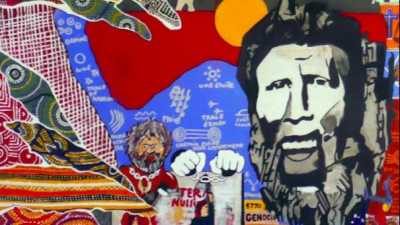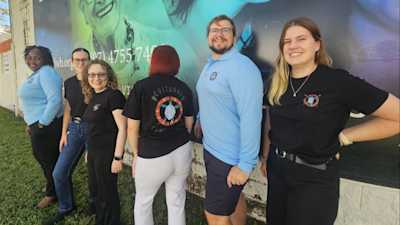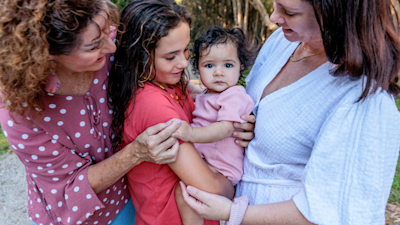Invasion Day, also called Survival Day or Australia Day, is commemorated annually on the 26th of January.

Image: A side profile of an older woman with short grey hair and a black coat.
Aboriginal and Torres Strait Islander visitors are advised that this story discusses difficult topics. You can find a list of support resources at the end of this article.
What is known to many as ‘Australia Day’ is currently celebrated on January 26, but this date is undergoing scrutiny as the public learn more of its history. This significant day, often considered a symbol of national identity, has a dark past that extends beyond the surface celebrations.
In recent years, there has been a growing debate and discussion surrounding the date of Australia Day as January 26. This is because the date marks the beginning of dispossession, violence, genocide, and the negative impacts of European colonisation on Indigenous communities. Many non-Indigenous Australians feel the same way and it is widely viewed as a day of mourning, rather than celebration. It is important to acknowledge that Aboriginal Australians occupied the land for over 50,000 years prior to the arrival of the British.
Calls for changing the date of Australia Day to a more inclusive day have been increasing.
Proponents of changing the date argue that it would allow all Australians to come together and celebrate the nation's identity, without causing pain or offense to Aboriginal and Torres Strait Islander communities.
Various alternative dates have been proposed as potential replacements for Australia Day. Some suggest January 1, the anniversary of the Federation of Australia in 1901, as a day to celebrate the birth of the nation. Others propose National Sorry Day on May 26, which acknowledges the historical mistreatment of Indigenous Australians and promotes reconciliation.

Image: Photo of people attending a rally in Melbourne, Australia. Photo: Xinhua
Increasingly, workplaces are allowing their employees to substitute the January 26 public holiday for a different day, either individually, or collectively as an entire workplace. Life Without Barriers offers all staff the option to choose an alternate day as a public holiday if they wish to.
Life Without Barriers does not observe January 26 as a celebration. We describe our commitment to reconciliation as living in our hearts and in our minds.
Claire Robbs, Chief Executive of Life Without Barriers, said now more than ever, this date is not uniting our nation.
“The 26th of January marks the beginning of dispossession and the generations of trauma and harm that followed. " Said Ms Robbs.
"It is time we heeded the voices and preferences of Aboriginal and Torres Strait Islander people and recognise that this date is not the birth of our country."
Our Elevate Reconciliation Action plan is our most courageous yet. Courageous because it requires us to step outside of what we have always done, to do things differently and to advance our country forward in truth-telling and with healing.
“Through our Elevate Reconciliation Action Plan, we have committed to listening to Aboriginal and Torres Strait Islander Peoples and communities and taking bold action to play our part in advancing Australia forward in truth-telling and healing."
“We hope in the future that Aboriginal and Torres Strait Islander people are consulted on a date that we can all celebrate, one that truly reflects the birth of Australia, our past and our future.” Said Ms Robbs.
What is happening around Australia on January 26?
A range of protests, ceremonies, and remembrance events are scheduled around Australia on 26 January 2025 – a way to mark the day respectfully. You can find a more extensive list of events here.
As we uncover these layers of Australia Day's history, it becomes evident that the ongoing debates about its date reflect a collective effort to reconcile the past and pave the way for a more inclusive and united future. The discussion surrounding the 'change the date' movement extends beyond a mere alteration of the calendar. In acknowledging the complexities of our history, we move towards a deeper understanding of what it means to be Australian.
We hope in the future that Aboriginal and Torres Strait Islander people are consulted on a date that we can all celebrate, one that truly reflects all the people in Australia, our past, and our future.
If you or anyone you know needs help
In the lead-up to January 26, and beyond, know that it’s okay to reach out for support.
Aboriginal & Torres Strait Islander crisis support line 13YARN on 13 92 76
AIMhi-Y: An app to support the well-being of First Nations young people, aged 12-25
Beyond Blue on 1300 224 636
Brother to brother 24-hour crisis line on 1800 435 799
eSafety Commission's First Nations resources
Headspace on 1800 650 890
Kids Helpline on 1800 551 800
Lifeline on 13 11 14
MensLine Australia on 1300 789 978
Suicide Call Back Service on 1300 659 467
The National Indigenous Postvention Service – After Suicide Support 24/7 1800 805 801
If you’re in an emergency situation or need immediate assistance, go to your local emergency department or call 000.


